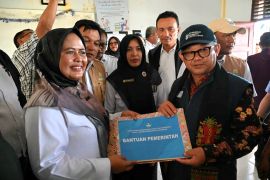Due to the lack of parental attention to the child`s nutritional intake, poor sanitation, and improper handling of infections, Indonesia is ranked fifth for the number of cases of stunting in children.
Career mothers are not blamed, but indeed the amount of time they have to cook themselves but choosing to eat instant or fast food can make housewives pay less attention to child nutrition.
As a result, children who are malnourished with a tiny and skeletal body who struggle to survive, can look a few years older than their true age.
According to the head of nutritional section at the Yogyakarta Health Office, Endang Pamungkasiwi, the emergence of cases of malnutrition does not always correlate with the economic conditions of a region.
In reality, Endang remarked that malnutrition problem does not always happen in poor families, but is experienced by children in high-income families.
The inability to properly care for children usually occurs in career women or those who work outside the home. In addition to not being able and not having a lot of time, they just entrust their children to caregivers who are also not equipped with the knowledge of how to care for a baby in the right way.
In order to cope with cases of malnutrition and stunting in children, Endang said there was a need to provide additional nutrition programs for pregnant women, and children in the form of biscuits, especially for areas found in cases of high malnutrition.
Cases of malnutrition and stunting in children are feared to be a serious threat to the golden generation of Indonesia in the future unless the problem is addressed properly.
Stunting also poses a threat to Indonesian human resources in the demographic bonus period if the population of productive age at that time becomes not qualified.
The serious threat will have an impact on the economic loss, because Minister of National Development Planning Bambang Brodjonegoro said the results of the study from the World Bank revealed that the potential economic losses caused by stunting reached two to three percent of Gross Domestic Product (GDP) per year.
It means that if Indonesia`s GDP reaches Rp13,588.8 trillion in 2017, the economic losses caused by stunting can reach Rp400 trillion per year.
On the contrary, intervention in reducing stunting will bring economic benefits of 48 times the investment incurred.
How small a matter of nutritional intake that is met in a mother and her child can have an impact on the economy massively in the future.
Director General of Information and Public Communication of the Ministry of Communication and Informatics Niken Widiastuti has said that stunted children is not only experienced by poor and underprivileged families, but also by non-poor families who are above 40 percent of the level of social and economic welfare.
In its effort to combat stunting rates in Indonesia, the government has included a reduction in stunting into the 2015-2019 Government National Medium Work Program target.
Stunted growth in children is often regarded as a hereditary factor so that it is ignored, but Niken has encouraged parents
to monitor the process of child growth and development, especially in the first 1000 days of life.
Parents and families are believed to play an instrumental role in preventing the occurrence of cases of low height or stunted growth in toddlers.
Identified by the World Health Organization as impaired growth and development in children due to poor nutrition, repeated infections, and inadequate psycho-social stimulation, stunted growth is not solely observed in poor families.
Stunting is experienced by children in 47 countries, including Indonesia, with the indicator still referring to a comparison between weight and age.
In terms of stunting, the National Demography and Family Planning Agency (BKKBN) will play its role in raising awareness among parents to participate in the fight against stunted growth.
One of its programs called the Family Planning Village, better known as "Kampung KB" aims to assist such parents.
Kampung KB offers technical services ranging from integrated service posts and prenuptial counseling to economic empowerment of families and parental care in preventing stunting.
Through the Kampung KB program, parents and teenage girls will be introduced to the issue of stunting and encouraged to have the ability to deal with the matter.
Indonesia has launched the Kampung KB as part of its efforts to revitalize the national family planning program aimed to help improve the health of its citizens.
The high number of cases of stunting in Indonesia is a matter of major concern, since Indonesia, as an agrarian country, is expected to meet the demand for food without having to import.
In contrast, countries, with limited agricultural land, such as Japan and Singapore, do not face a food problem although they still depend on imported food, Director of the Institute for Development of Economics and Finance Sri Enny Hartati explained.
Hartati believes that the issue of nutrition must be immediately handled, as it can threaten human resources in future. If the future generation is weak, they will find it difficult to compete with other countries` human resources and will remain a burden on the economy.
In the future, the economy will be based on innovation and creativity that require smart human resources to enable them to compete with those of other countries.
Hence, the government is expected to handle the issue of stunting and malnutrition promptly.
Malnutrition is an interconnected issue, involving low community welfare, job opportunities, education level, and competitiveness, which necessitates the use of "scissors" to break the chain.
Editing by Rahmad Nasution
Reporter: Otniel Tamindael
Editor: Heru Purwanto
Copyright © ANTARA 2018












